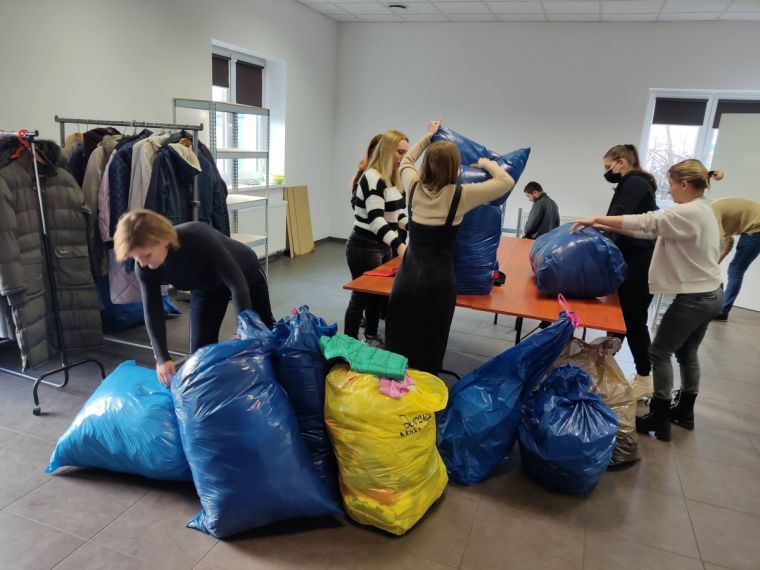Amid the war and the heartache, the Lord is at work in Ukraine

I am heartbroken by this war - how can one not be heartbroken? It is beyond anything I have seen in the 28 years I have lived in Ukraine, working with the missional organisation Operation Mobilisation (OM).
Along with planting churches and other projects, we have been actively involved in the birth of the now officially recognised chaplaincy programmes - programmes for those affected by the ongoing war over the last eight years. This ministry to the war-affected was literally established while under artillery and mortar fire. But now? Now we are providing food and shelter for thousands of people fleeing their homes. Families fleeing cities under siege.
Sixteen days into the war, the church continues to be a half-way house, providing temporary refuge and food for dozens of those fleeing their homes on the arduous journey west to the border with Europe.
After reported attacks near our town, I relocated my family to a safer place. It has allowed me to concentrate my efforts on leading the OM ministry efforts, support our teams and coordinate projects ministering to refugees and ministries needing support in this ever growing crisis.
OM have teams in Moldova, Poland, and Romania and other bordering counties we are working with to provide food, shelter and safe passage for refugees. But this is not a situation beyond hope. The Lord is at work in Ukraine.
When I moved to Ukraine from Australia in 1993, I arrived in a post-Soviet country that had been born about 18 months earlier. I found myself surrounded by the remnants of the Soviet Union, not just physically but in the mindset of the people. They were a people used to being abandoned, used to being in dire straits.
Not many people know what Ukraine has been through, but this has been the story of the last 100 years. After years of abuse and instability there was a deep-rooted fatalistic mentality. The attitude was pretty much summed up as 'we're all going to die anyway so what's the point?'. There was no faith or pride in the community. Don't stick out, don't take risks.
I found myself pastoring a church with an unemployment rate of nearly 100 per cent within the congregation. No stability. No income. No hope. People were feeding themselves from the potatoes they grew in their garden, with no money to pay for heating when winter came.
But there was also an enormous spiritual hunger. In the 1990s, it truly felt like the fields were white for harvest. We held out the hope of the gospel and saw people give their lives to Christ in huge numbers. It was an incredible place to be - it still is.
As I looked at my congregation and the community, I saw that showing them the love of Jesus went beyond just words. I have always believed that, when heaven has come into your heart it is not far from your heart to your hands. So, I turned to the Lord and said, 'OK Lord, what does the gospel look like in this place?'. We began by growing mushrooms in the church basement. God also provided a partnership with McDonalds, turning their used French-fry oil into biofuel. We were able to start providing employment in the community and disciple people in the workplace.
As the political turmoil has continued, we have had to change and adapt. The shape of ministry has had to change. In 2014, war arrived. We lost our contract with McDonalds. But the changes we faced were nothing compared to the seismic shifts about to take place in Ukrainians' attitudes.
The "Revolution of Dignity" of 2014 was a major catalyst of change in the minds and hearts of the Ukrainian people. It was like the embodiment of rebirth of the modern Ukrainian nation. The country began to have a sense of pride, a pride that hadn't been in evidence for decades. People weren't afraid of being punished any more. They were willing to stand up for their freedom.
But the spiritual hunger seemed to dry up and reaching people for Christ became much harder.
With each shift we have turned to the Lord and asked, 'OK Lord, what does the gospel look like now?'. And God has provided. We saw the miraculous provision of a disused vegetable warehouse to begin a new project, 'Clean Soul - Clean City'; transforming large amounts of unrecyclable post-consumer plastic from our town into fuel enabling us to provide work and share life.
War arrived and we asked the same question. The answer wasn't long in coming. There is desperate need all around us. People who have lost everything. People are being confronted with death and separation every day. Heaven is never far from their minds, and it is never far from our hands or our lips. We are doing everything we can to provide for their physical needs and we are holding out the hope of the gospel even as we cling to it ourselves.
Russia's invasion of Ukraine shocked people around the world. But arguably the group of people it shocked the least were Ukrainians. They have been in an undeclared war for nearly a decade. The bridge between the east and the west: standing in the gap. As Christians in Ukraine, we have been called to stand in that gap. Standing in a haemorrhaging relationship holding out hope, holding out Christ.
To find out more and give to the work of OM in Ukraine visit: https://www.uk.om.org/appeal/ukraine-in-crisis
Wayne Zschech is the Fields Leader of Operation Mobilisation in Ukraine, overseeing their teams across the country. He is originally from Australia but moved to Ukraine at the age of 17 for what was meant to be a one-year trip, he never left. He is a pastor and entrepreneur. His wife and four children are Ukrainian.











